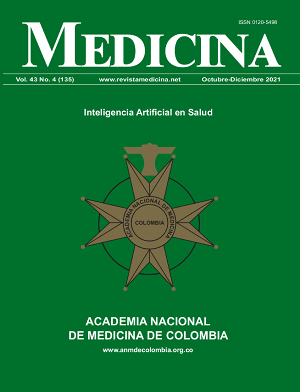La inteligencia artificial en oncología: contexto actual y una visión hacia la próxima década
DOI:
https://doi.org/10.56050/01205498.1642Palabras clave:
Inteligencia artificial, aprendizaje profundo, aprendizaje automático, Oncología, medicina personalizadaResumen
La inteligencia artificial (IA) ha contribuido sustancialmente a la resolución de una variedad de problemas biomédicos, incluido diversos eventos relacionados con el cáncer. El aprendizaje profundo (deep learning), un subcampo de la IA que es altamente flexible y admite la extracción automática de características, y se aplica cada vez más en diversas áreas de la investigación del cáncer tanto básica como clínica. En esta revisión, se describen numerosos ejemplos recientes sobre la aplicación de la IA en oncología, incluidos casos en los que el aprendizaje profundo ha resuelto de manera eficiente conflictos no resueltos. También se abordan los obstáculos que deben superarse antes de que dicha aplicación pueda generalizarse. De igual forma, se destacan los recursos y conjuntos de datos que pueden ayudar a aprovechar el poder de la IA dirigida a la investigación. El desarrollo de enfoques y aplicaciones innovadores de la IA generará conocimientos importantes en oncología que permitirán modificar ampliamente la práctica clínica.
Biografía del autor/a
Arturo Loaiza-Bonilla, Cáncer. Treatment Centers of America
MD, MSEd, FACP. Oncólogo médico. Coordinador del Programa Nacional Neoplasias Gastrointestinales y Director Médico de Investigación Clínica en Cáncer. Treatment Centers of America, Comprehensive Care and Research Center, Atlanta y cofundador de Massive Bio, Nueva York.
Referencias bibliográficas
2. Jensen PB, Jensen LJ, Brunak S. Mining electronic health records: towards better research applications and clinical care. Nat Rev Genet. 2012 May 2;13(6):395- 405. doi: 10.1038/nrg3208.
3. Luo J, Wu M, Gopukumar D, Zhao Y. Big Data Application in Biomedical Research and Health Care: A Literature Review. Biomed Informat Perspect. 2016;S31559. Luo J, Wu M, Gopukumar D, Zhao Y. Big Data Application in Biomedical Research and Health Care: A Literature Review. Biomed Informat Perspect. 2016;S31559.
4. Miotto R, Wang F, Wang S, Jiang X, Dudley JT. Deep learning for healthcare: review, opportunities and challenges. Brief Bioinform. 2018 Nov 27;19(6):1236-1246. doi: 10.1093/bib/bbx044.
5. McDonald RJ, Schwartz KM, Eckel LJ, Diehn FE, Hunt CH, Bartholmai BJ, et al. The effects of changes in utilization and technological advancements of cross-sectional imaging on radiologist workload. Acad Radiol. 2015 Sep;22(9):1191-8. doi: 10.1016/j.acra.2015.05.007. Epub 2015 Jul 22.
6. McKinney SM, Sieniek M, Godbole V, Godwin J, Antropova N, Ashrafian H, et al. International evaluation of an AI system for breast cancer screening. Nature. 2020 Jan;577(7788):89-94. doi: 10.1038/s41586-019-1799-6. Epub 2020 Jan 1.
7. Pacilè S, Lopez J, Chone P, Bertinotti T, Grouin JM, Fillard P. Improving Breast Cancer Detection Accuracy of Mammography with the Concurrent Use of an Artificial Intelligence Tool. Radiol Artif Intell. 2020 Nov 4;2(6):e190208. doi: 10.1148/ryai.2020190208.
8. PRNewswire. Therapixel receives FDA 510(k) clearance for MammoScreen™. [Internet]. [Consultado el 11 Oct 2021]. Disponible en:
https://www.prnewswire.com/news-releases/therapixel-receives-fda-510k-clearance-for-mammoscreen-301090534.html.
9. Khosravan N., Bagci U. (2018) S4ND: Single-Shot Single-Scale Lung Nodule Detection. In: Frangi A., Schnabel J., Davatzikos C., Alberola-López C., Fichtinger G. (eds) Medical Image Computing and Computer Assisted Intervention – MICCAI 2018. MICCAI 2018. Lecture Notes in Computer Science, vol 11071. Springer, Cham. https://doi.org/10.1007/978-3-030-00934-2_88.
10. FDA. FDA Authorizes Software that Can Help Identify Prostate Cancer. [Internet]. [Consultado el 11 Oct 2021].
Disponible en: https://www.fda.gov/news-events/press-announcements/fda-authorizes-software-can-help-identify-prostate-cancer.
11. Garberis IJ, Saillard C, Drubay D, et al. Prediction of distant relapse in patients with invasive breast cancer from deep learning models applied to digital pathology slides. ESMO Congress 2021 (16-21 September).
12. Fu Y, Jung AW, Torne RV. Pan-cancer computational histopathology reveals mutations, tumor composition and prognosis. Nat Cancer. 2020;1:800–810. doi: 10.1038/s43018-020-0085-8.
13. Senior AW, Evans R, Jumper J, Kirkpatrick J, Sifre L, Green T, et al. Improved protein structure prediction using potentials from deep learning. Nature. 2020 Jan;577(7792):706-710. doi: 10.1038/s41586-019-
1923-7. Epub 2020 Jan 15. P.
14. Sahoo D, Swanson L, Sayed IM, Katkar GD, Ibeawuchi SR, Mittal Y, et al. Artificial intelligence guided discovery of a barrier-protective therapy in inflammatory bowel disease. Nat Commun. 2021 Jul 12;12(1):4246. doi: 10.1038/s41467-021-24470-5.
15. Mahmood R, Babier A, McNiven ALL, Diamant A, Chan TCY., “Automated treatment planning in radiation therapy using generative adversarial networks,” Proceedings of Machine Learning Research, Vol. 85 (Machine Learning for Healthcare), pp. 484-499, 2018.
16. Mu W, Jiang L, Zhang J, Shi Y, Gray JE, Zhao X, et al. Radiomics and AI-based treatment decision support for non-small cell lung cancer [abstract]. In: Proceedings of the AACR Virtual Special Conference on Artificial Intelligence, Diagnosis, and Imaging; 2021 Jan 13-14. Philadelphia (PA): AACR; Clin Cancer Res 2021;27(5_ Suppl):Abstract nr PR-03.
17. Desai A, Loaiza-Bonilla A, Culcuoglu A, Johnston C, Kurnaz, S. Outcomes and applicability of a deep learning virtual tumor board (DLVTB) in community-dwelling colorectal cancer (CRC) patients. Journal of Clinical Oncology 39, no. 15_suppl (2021), https://doi.org/10.1200/JCO.2021.39.15_suppl.e18635.
18. U.S. National Library of Medicine. SYNERGY-AI: Artificial Intelligence Based Precision Oncology Clinical Trial Matching and Registry. [Internet]. [Consultado el 11 Oct 2021]. Disponible en:
https://clinicaltrials.gov/ct2/show/NCT03452774.
19. Boehm KM, Khosravi P, Vanguri R, Gao J, Shah SP. Harnessing multimodal data integration to advance precision oncology. Nat Rev Cancer. 2021 Oct 18. doi: 10.1038/s41568-021-00408-3. Epub ahead of print.
Cómo citar
Descargas
Publicado
Número
Sección
Licencia
Derechos de autor 2022 Medicina

Esta obra está bajo una licencia internacional Creative Commons Atribución-NoComercial-SinDerivadas 4.0.
Copyright
ANM de Colombia
Los autores deben declarar revisión, validación y aprobación para publicación del manuscrito, además de la cesión de los derechos patrimoniales de publicación, mediante un documento que debe ser enviado antes de la aparición del escrito. Puede solicitar el formato a través del correo revistamedicina@anmdecolombia.org.co o descargarlo directamente Documento Garantías y cesión de derechos.docx
Copyright
ANM de Colombia
Authors must state that they reviewed, validated and approved the manuscript's publication. Moreover, they must sign a model release that should be sent.





